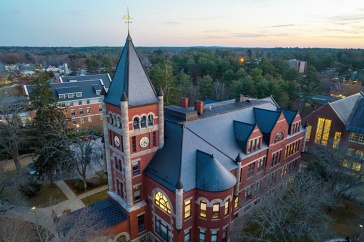
When Christopher LeBlanc, assistant professor of electrical engineering technology, suggested that then-engineering student Adam Connolly '16 bring his resume to the Undergraduate Research Conference, Connolly decided to follow his advice. At the annual event featuring projects students complete in a focused area of study, representatives from the area’s largest employers and top tech firms attend to observe and judge the engineering technology students’ presentations.
“I met people from Mitre, Texas Instruments, BAE and through that got an internship at BAE,” he said.
Connolly completed his capstone project as part of the internship and after graduation was hired as a test engineer with the company. Today, Connolly works at the Nashua location, was accepted to the company’s extremely competitive Engineering Leadership Development Program and is enrolled in a master’s degree program. He is one of a number of UNH Manchester Engineering Technology graduates who work at BAE Systems, and part of a greater group of alumni working at the many tech and manufacturing companies in the area.
“BAE is hiring like crazy,” said Connolly. “A lot of these companies are. I think what engineering students are seeing is that they are valuable and are getting strong competitive offers.”
Connolly has passed on resumes of fellow UNH Manchester alumni to BAE and has seen three graduates hired at the company. He’s also held casual meet-ups with new hires as they get to know the company, answering any questions they might have.
James Schumacher '17, an alumnus of the electrical engineering technology program, landed a phone interview with BAE shortly after graduation.
“That went well, and they scheduled an in-person interview, which also went well,” said Schumacher, who works in software development. “A few days after the in-person interview, I was offered the position I applied for, and I accepted.”
Shawn Snook '17, a graduate of the mechanical engineering technology program, was hired as a process engineer at BAE after applying online.
“I love everything about my job,” said Snook. “There is always something going on. I get to work on really interesting projects.”
His advice to UNH Manchester students in the engineering technology program is to take advantage of the ample internship opportunities available. Snook interned at both TEREX and VELCRO.
“The more time they invest in the class work and doing internships, the more competitive they will be when looking to start their careers,” said Snook.
UNH Manchester has developed a strong relationship with local technology and manufacturing companies, largely to help students forge relationships that will later land them jobs, but also to help local firms fill the growing need for engineers. LeBlanc points to UNH Manchester’s internship program, as well as the engineering technology program’s advisory board, made up of representatives from industry, community colleges and the University System of New Hampshire. Meeting twice a year, the advisory board discusses student outcomes, educational objectives, curriculum tracks and new technology and equipment the school should acquire. Although there has been some discussion over the years to create a stand-alone manufacturing program to train students for local manufacturing jobs, LeBlanc said the strength of UNH Manchester's engineering technology program is that is provides students with a diverse set of skills.
Having a strong local engineering program is key to filling that need for engineers. Connolly observed that at BAE, as well as other companies in the area, that a lot of the baby boomers are reaching the age of retirement.
“Because there are so many of them, they’re leaving a massive void,” said Connolly.
This need creates a favorable climate for graduates. In hopes of recruiting the best candidates and retaining young workers, Connolly said BAE is offering not just competitive salaries, but other programs like group activities for entry-level engineers and tuition reimbursement programs.
“We are not training our students for a specific skill set for one industry. We want to get students a background in a wide set of skills,” said LeBlanc. “The engineering technology students are trained for those manufacturing jobs. The vast majority of our students are going to be working in some manufacturing role.”
-
Written By:
Beth LaMontagne Hall | Freelancer
















































